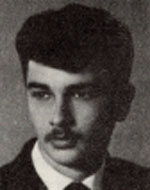Shmuel (Sioma), son of Halina and Boris, was born on February 26, 1948, in Riga, USSR. In 1958 he immigrated to Israel with his parents and the family settled in Kiryat Yam and later moved to Kiryat Haim. Shmuel, or Jeunelle, in the words of his parents, was their eldest son, their precious child of care, for whom they had devoted the best of their time and energy. His sister was born eleven years later. After one year of study in Riga, Shmuel completed his elementary studies at the “Mefalsim” school in Kiryat Yam, where his talents were discovered, although he found it difficult to absorb the Hebrew language. Shmuel went on to study at the Rudman High School in Kiryat Yam, but soon realized that he was leaning toward the real professions and went to study at the Technion’s engineering school. Shmuel was an outstanding student at his school. His friend, Miki, said: “I knew Shmulik from childhood, and when I try to find a new line in his personality, I see especially his desire to move forward and succeed.” Shmulik came to the engineering school after two years of high school without the technical background provided by the vocational school Thanks to his ambition and his will, he soon became an outstanding student in all the technical subjects, and when we finished school, it was decided that Shmulik was the outstanding student of the class. ” Shmulik’s activity was not limited to studies. He was a member of the Hanoar Haoved Vehalomed movement. He loved to travel around the country, always arguing enthusiastically about the future of the country, and in the Six-Day War, after his early enlistment request was rejected, he volunteered to work in a weapons factory. Shmuel was drafted into the IDF in mid-February 1968, and was assigned to the Ordnance Corps, where he underwent a turret technician course. In this position he served all the days of his service. During his service, Shmulik wrote a book explaining the operating principles of the cannon in the Sherman tank and the methods of its maintenance. The book was published by the Chief Ordnance Ordnance Command. His discharge certificate from the regular army states that he “fulfilled his duties efficiently and with great professionalism.” In mid-February 1971, Shmuel completed his compulsory service, and when he went to civilian life, he began working at the Soltam plant. At the same time, he prepared himself for studies at the Technion, in the Faculty of Industrial Engineering, and was admitted to the Technion and was one of the outstanding students in the faculty. In August 1972 he married his girlfriend Hadassa, who was also studying, and they continued their studies and at the same time built their new family life together. At that time he lived in Neve Sha’anan. In the Yom Kippur War, Shmuel joined his unit on the southern front. On the 22nd of Tishrei 5734 (October 22, 1973) in one of the battles that took place between Ismailia and the Great Bitter Lake, his tank was hit by a missile and Shmuel fell. He was brought to eternal rest in the Haifa cemetery. Survived by a wife, parents and sister. In a letter of condolences to the family, Defense Minister Moshe Dayan wrote: “Shmuel was a devoted soldier and a loyal friend, and Shmuel was loved by everyone who knew him.” His beloved sister said to him: “For me, Shmulik was a kind of father who set the beginning of my path and my desire to be the symbol of modesty, and for his friends he was a leader … Just as I admired him and obeyed all his commands and requests, so did his friends. He was very warm in nature and gave honor to his parents, and even after he married, he maintained close ties with me and with our parents … I was always proud of Shmulyak, when Shmulik came home, the house was filled with light. More, with a smile, almost always on his face, with a matte hairAnd devaluation and expression ‘masquerade’ – that’s how I met Shmulik for the first time. His self-confidence was dominant in his character. I remember many cases where we had arguments, in which Shmulik tried to prove that he understood and knew things better and when he thought he was right, he did not hesitate to quarrel with his commanders. ‘Let’s bet you’re not right’ – he used to defy him and immediately lectured as he spoke of theories that tried to prove that in fact, apart from him, there was no one who understood the problem. The interventions were a permanent component of the labor relations between us and when he was wrong he knew how to lose respectably. Sometimes I found myself thinking: Where did this young man get the inner strength to deal with officers who were older than him in the same tone that showed so much confidence. How characteristic of him, pride and self-confidence and the ability to instill these feelings among his friends. With the constant smile on his face, Shmulik returned to the hearts of his friends and sang a good atmosphere around him, revealing a healthy sense of humor. “
